
An appealing lawyer.
Chen Tumi grew up studying the Tang legal code with her mother's handwritten notes. It was her only link to her dead mother. When her father is wrongly indicted for a crime, she defies convention to defend him in court. She is an appealing lawyer both literally and figuratively. Her determination, intelligence, and logical arguments catch the attention of powerful actors including Crown Prince Han Wuwei and Kang Zhengyuan of the powerful Dali Temple (judiciary). She is quietly aided by the mysterious Ye Cha.Similar to the Justice Bao stories, the legal cases in Ms. Chun is a Litigator deal largely with the common people. The cases are quite engaging and easy to follow with well-written and satisfactory outcomes. The court arguments are livened up by the amusing and friendly rivalry between Prince Han and Official Kang. While it is a bit of a Mary Sue kind of setup where everyone falls for Tumi, this funny and lighthearted quadrangle never gets annoying. Tumi is such a breath of fresh air - although she is young and inexperienced, she is clever and logical. She is able to seek and accept help without seeming weak or coming across as a damsel in distress. I am pleased to come across this very natural and charming young actress Zhang Dafei who has many interesting roles in upcoming dramas. The bromance and hilarious banter between Han Wuwei and Kang Zhengyuan is another very entertaining aspect of this drama. I checked this out because of Huang Junjie and found myself delighted and entertained by the chockfull of eye candy that makes up the charismatic young cast.
This drama's greatest shortcoming is that there are obviously many cut scenes or arcs. This affects how the larger conspiracy unfolds and leaves open some plot points. Some of the character and relationship development also feel uneven. Both Kang Zhengyuan and Ye Cha are well designed personalities that didn't get fleshed out enough. I would have liked to see Tumi interact more with Zhengyuan as he shows her the ropes in terms of judicial process. While saved by the clear spark of attraction between them, Tumi's relationship with Ye Cha seems to advance too quickly. Finally Wuwei's persona appears to take a baffling darker turn towards the end. While this wraps up well enough, there are enough unanswered questions and open plot points that beg for a second season. I would rate this higher than 7.5 were it not for the fact that it leaves a slight unfinished taste in my mouth, though not enough to ruin the drama. This drama is a lot of fun and the cast is simply a joy to watch. I am looking forward to season 2 but there is no need to wait to start this as it seems intended to be an ongoing episodic series.
Was this review helpful to you?
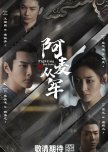
For clown and country.
Fighting For Love is a drama adaptation of a novel with the same Chinese title Ā Mài Cóngjūn/阿麦从军 or A Mai Joins the Army. The novel enjoys an impressive 8.6 score on Douban. It is a female centric story about A Mai, an orphaned noblewoman who seeks justice for her family's betrayal. She joins the army and works her way up to become a fierce and undefeated general. She discovers a greater purpose along the way, which is to defend her country. This takes place during the Northern and Southern dynasties, a period of war, chaos and political turmoil. It is not a romance and there is no real male protagonist; it is about one brave and patriotic woman's awesome journey. I abandoned the book because of its intense and graphic focus on war.Clearly the original story does not fit with the typical male-centric costume drama formula with plenty of romance tropes. What a breath of fresh air, right? Wrong. In the adaptation, Shang Yizhi is elevated to male protagonist and his story arc is as central as A Mai's. Which in and of itself, is not a terrible thing. Like A Mai, Yizhi has a hidden identity and was a victim of foul play. His cause becomes hers as she rescues him and helps him outsmart his enemies. She discovers her military prowess, forms life and death bonds with her troops and finds meaning in defending the citizens of Nanxia. They have a shared purpose and are catalysts for each other's growth. It is natural for attraction or feelings to develop between them though it does not need to be romantic.
The critical fail in the adaptation is they wrote Yizhi as a kind hearted and playful anti-hero character. While some of his comedic scenes are witty and funny, this diminishes him into a parody role. This should be a complex character who does consequential things; a once carefree young nobleman whose world changes overnight. Instead, the writers stuck him with a love brain and Peter Pan syndrome until the final arc. As he is pushed first to survive and then to reclaim his birthright, all of his motivations continue to simply revolve around A'Mai. A character that chooses each time to save the girl and let the world rot does not deserve to end up where he does! This devalues A'Mai and the Zhenbei army's achievements and sacrifices into a fight for clown and country. Even though he becomes morally ambiguous and utilitarian at the end, this evolution is too abrupt. His character progression should have begun well before he returned to the capital. Zhang Haowei did his best with this role but the character is just too poorly designed.
A Mai is quite consistently written throughout even though it is difficult to connect with her feelings for Yizhi. Even though she is too lovely to ever be mistaken for a man, Zhang Tianai does a wonderful job with the role. Her mannerisms are very masculine and she literally shakes with rage and hatred in her scenes with Chen Qi. Best of all, she is no Mary Sue in need of constant rescuing even though all the men fall for her. She just has terrible luck with men; she gets involved with a backstabber, a clown and an enemy with a choking fetish. The one good man she meets is brother-zoned, father-zoned and what happens to him is definitely over-kill. Chen Qi is the most interesting and conflicted antagonist and his and A Mai's story is really sad. Wang Ruichang is very charismatic and the fan favorite but his Chang Yuqing has no development and no real story arc. He just pops up whenever something needs to go wrong for the leads.
The first few arcs of this story are quite good and the cinematography and action scenes are pretty awesome. The story falls apart mid-way and snowballs downhill into the palace arc. It is yet another perfectly good drama that is ruined by ignorant and silly romance writers who can't write palace intrigue (i.e., Destined, Legend of Zhuohua, Wonderland of Love etc etc). This arc is ridden with predictable villains, plot holes, clichés and a flabby dancing emperor who looks like a sloppy fashion mistake. To my surprise, the story comes together again in the final episodes to end fittingly and on a strong note.
It is not easy to rate this because there are many good parts. The first 12-15 episodes and the ending is good and worth ~8 but the middle and dreadful palace arc are only worth ~6+. I think ~7.5 overall is fair but I am only going to call it a 7.0 because the production deserves to be spanked for desecrating a fantastic novel.
Scroll down for SPOILER ending thoughts.
ENDING SPOILER
The final showdown between A Mai and Chen Qi is exciting and moving and it finally gives her closure. Poor Chen Qi is such an interesting, conflicted and ultimately tragic character it is a shame he was not better fleshed out. In the end he probably loved A Mai best.
I don't believe it is in character for A Mai to go off with Chang Yuqing at the end. His feelings for her are not better developed than Yizhi's and at least in the drama, they are one-sided. He is a rising star in Beimo and if A Mai were to marry him, she would have to defect to the enemy to be another caged bird as the wife of a Marquis. After just escaping the terrible fate of being the favorite concubine of an emperor?!? As advisor Xu points out, the countries are at perfect stalemate because their top generals A'Mai and Chang Yuqing don't really want to fight each other. There is peace with them glowering fiercely at each other across the border. A Mai is simply setting off for a well earned 3-year vacation while Beimo's internal palace politics play out. It is a perfect, strong independent woman ending in the spirit of the original novel; one that says A Mai does not have to be someone's arm candy to have a meaningful life.
X
Was this review helpful to you?

Who's your daddy?
Destined is a story about how an unlikely couple discovers themselves and each other and survive turbulent times together. Liu Yuru has been auditioning all her life to be a worthy wife to the finest young gentlemen in Yangzhou. To her aghast, she finds herself engaged instead to Gu Jiusi, the scandalous scion of Yangzhou's wealthiest family. Gu Jiusi is no less dismayed to find himself shackled to such a paragon of virtue but he is chastened by his careless prank that got them in that situation. They hilariously find that they are actually well suited and the sum of their parts is greater than the whole. The first arc is by far the best; it is funny, romantic and underpinned by genuine chemistry and rapport between Song Yi and Bai Jingting.The couple's newfound bliss does not last as the country is swept into chaos as civil war breaks out. At their loss of influence in the capital, the Gu family is forced to flee Yangzhou for Youzhou far to the north. There they are still inevitably caught up in the war and ensuing political upheaval. Meanwhile, in the shadows, a hidden mastermind plots their downfall at every turn. There is a marked dark tone shift in the drama as it delves into the political arcs in the latter half. This drama explores the - "Who's your daddy?" question and whether it matters. All of the main characters have bad dads to different degrees; overly-indulgent, indifferent, overly-judgemental, negligent, wilfully blind and missing in action. Most of them are no worst for the wear but others allow their resentment to get the better of them.
This is a very entertaining drama despite that the second half is sloppily written and ridden with logic holes. The source material evidently had more substance and depth but the drama adaptation falls short on multiple fronts. The plot and character designs don’t make sense without novel readers to help connect the dots (see @CloudA’s discussion threads). The best written parts include most of Jiusi and Yuru’s arcs and humorous moments. The political arcs have too many logic gaps and farcical sub-plots that undermines the intelligence of allegedly smart characters. The writers have a very superficial understanding of history, politics and inner palace protocols. It is mystifying why the Dowager Empress does not secure the position of crown princess for her daughter in exchange for her support. Instead she uses up all her goodwill to try to foist her on a happily married man! The new emperor is so weak instead of banishing these harpies to the cold palace, he allows them free rein to bully his loyal court officials and interfere in official proceedings. He puts a known villain in charge of the crown prince's education when both Ye Sh'an and Gu Jiusi are obviously better choices. They forgot to tell us Luo Zishang has an invisibility cloak that gives him better access to the emperor's bedchamber than a favorite concubine! Game of thrones in this drama pretty means Pass the Throne (parcel). This kind of writing is why fluffy romance writers should stick to their knitting and not try to write about stuff they know nothing about.
What does make this drama work is phenomenal acting all around that papers over the lousy writing. All of the main actors are incredibly charismatic and blend into their roles so well that the portrayals surpass the character blueprints. This is especially true of Liu Xueyi's mesmerising ability to make the vicious, misguided and tragicomic Luo Zishang seem sympathetic even though his backstory and motives are not well explored and only fully revealed at the end. As a result, for most of the drama, this character comes across as a cardboard villain; a delusional sociopath that is just evil for the heck of it. Similarly Fan Yu's character evolution takes abrupt turns and his interest in succeeding his father is not well explained. Fortunately the good characters in this drama are far better written than the tired trope of villains who blame their bad behavior on their bad dads. Their motivators are not as forced and it is a lot of fun to watch the rapport, loyalty and friendships between them blossom so organically. After Jiusi and Yuru, Zhou Ye is my favorite character even though he can be a noble idiot. He just gets really hard things done and done right in the nick of time to save the day.
In the final arc, both Jiusi and Yuru are sidelined so that everyone else can do absurd things to let the villain easily get the upper hand. We are short changed of a satisfying final battle of wits between Jiusi and Zishang to make way for a very anti-climatic reveal of Zishang's backstory that devolves further into a maudlin moment of truth and reconciliation that somehow diminishes both characters.Along comes Zhou Gaolang to bravely re-take a city that was already in hand! There was a senseless, gratuitous death of a terrific character just to squeeze a few audience tears and to add insult to the injury, the perpetrator was unjustly sentenced to live the life of the idle rich. While many favourite characters got good outcomes, some of them deserve better and the final denouement fell flat and was anti-climatic This drama peaked too early at King Liang's epic siege and went downhill from there. The early arcs were an 8.5 for me but the back half was at best 7.0/7.5. Even though I can only rate this 8.0 overall, it is still a very enjoyable drama that is shored up by some fantastic acting. It is best watched tipsy or with your brain half switched off as the plot does not bear close scrutiny.
Was this review helpful to you?

Can't judge a book by its cover.
Judge Dee is one of the most widely adapted and iconic ancient Chinese detective figures in popular culture. Di Renjie, or Judge Dee was a prominent Tang Dynasty official and twice chancellor to Empress Wu Tzetian. In the 19th century, Dutch sinologist and diplomat Robert Van Gulik translated an 18th century novel by an anonymous author Dí Gōng Àn/狄公案/Celebrated Cases of Judge Dee, into English. He went on to write numerous other Judge Dee mysteries, increasingly crafting Judge Dee in his own image. Van Gulik's books are regarded as a cultural bridge between East and West. They were devoured by the Chinese diaspora long before Tsui Hark fanned the flames with his wildly popular Detective Dee movies.Judge Dee's Mystery/大唐狄公案 loosely adapts nine cases from Van Gulik's novels for the small screen. This drama has notably high production values with lavish sets and costumes designed to create an immersive visual experience. The cases are well crafted with meticulous attention to detail and pay homage to Judge Dee's reputation as a people's hero; a champion of truth and justice for the common people. The cases highlight the discontent at some of Empress Wu's policies and shortcomings of the Tang Code, China's earliest legal code. Di Renjie gained many insights on the struggles and aspirations of the common citizens as magistrate of many important provinces across the empire. This shaped him into a great statesman and reformer in his later years; a chancellor often known to stand up to the formidable Empress.
This is the kind of drama that I should love - its my favorite genre featuring my favorite Chinese detective, set in my favorite Chinese dynasty and is helmed by a few of my favorite actors. The fight scenes are fantastic and the whole thing just looks gorgeous and bloody expensive. Which just goes to show you, you just can't judge a book by its cover. Because even though there are some really great moments, overall this drama just bored me silly.
The problem with the cases is that the four episode are too long when the villain is usually obvious from the beginning. There is not enough development of the suspects or the victims to make the audience care about the why-did-it. The audience also does not get to participate in the solution. Instead, the intricacies of the how-did-its are revealed as flashbacks in Judge Dee's mind's eye. The cases do get better in the latter half as they tie into Judge Dee's past and are shored up by the appearance of characters like Diao Xiaoguan (Zhang Ruoyun) and Lin Fan (Jiang Yi). Even then, the writing tends to tie the minute details together well while leaving big gaps on important things. Thus it is never fully explained what Diao Xiaoguan's motives were or what terrible thing the young scion of a noble household did that got him disowned and left to fend for himself.
The biggest issue with this drama is that Zhou Yiwei pretty much carries the entire crime-solving team by himself. None of the supporting characters are well designed and there is zero chemistry between Ma Rong, Qiao Tai and Judge Dee. This is made even more obvious when Deng Xiaoguan shows up and there is a tangible difference in the dynamics between everyone. Both of Dee's sidekicks appear and disappear inexplicably in the middle of a case as and when the plot requires. Ma Rong is written to be a comically obnoxious character but there is nothing funny about her obnoxiousness. This is the obvious the weak link in the cast and one that is utterly lacking in charisma that unfortunately gets too much airtime. Inasmuch as Zhou Yiwei and Wang Likun deliver a heart-stopping and mature portrayal of attraction and love at first sight, sadly Cao An is written to be a blank character; an elegant musician well past her youth clinging to a silly girlish fantasy over a highwayman (face palm). She only serves decorative purposes until the final case, where she finally gets to shine with her bravery and her foolishness.
In conclusion, this is a visually stunning production that stays true to its source material in terms of setting and thematic elements. However, despite some exciting and well choreographed action scenes, it fails to deliver truly captivating mysteries and is bogged down by lackluster supporting performances. While the cases in Strange Tales of Tang Dynasty (2022) are only a tad more tightly written, the humor and fantastic crime solving team dynamic elevates that series over this one. That said, Judge Dee's Mystery is not a terrible way to pass some time even though it ultimately falls short of making a lasting impression. I rate this Seasons 1 a 7.5/10.0. Season 2 has been filmed and should air by early 2025.
Was this review helpful to you?
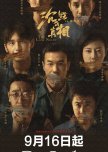
Scorched earth.
This is an artfully related dark crime thriller about a long, life blood sucking and soul destroying quest for justice. A body in a suitcase, a bomb scare, an incriminating old photograph and a looming terrorist threat captures headlines and puts acclaimed investigator Yan Liang on the case. He quickly discovers that these events are linked to a decade old cold case. The narrative navigates three time periods and alternates skillfully between the original team on the case led by prosecutor Jiang Yang (Bai Yu) and the present investigation led by Yan Liang as both investigations proceed down a parallel path. This is done so seamlessly it is not at all confusing; indeed all of the characters, events and clues flow fluidly and clearly. The pallete is sparse and dark toned consistent with the title and tone of the drama.While the mystery and suspense part of the drama is very well written and doesn't reveal itself too soon, this is really more of a character drama about Jiang Yang, a brilliant young prosecutor with a lot of fire in his belly. Without a doubt, this is Bai Yu's best acted role to date. His signature gigantic forehead was so well concealed I didn't recognize him for awhile. The way his Jiang Yang's indomitable idealistic youthful spirit is extinguished into a subdued, quiet desperation and almost but not quite defeated acceptance is one of the most moving and nuanced portrayals I have seen in a long time. He deserves to win awards for this role. I wish I could say the same for Liao Fan's Yan Liang but I was not wowed by his crime solving brilliance which is supposedly signified by pondering and obsessive ball bouncing. Despite some failed and misplaced attempts at humor, Yan Liang's present day team also lacks the rapport and chemistry that oozes out of Jiang Yang's "hot pot" team. Anchored by Bai Yu's powerful performance and a solid cast overall, there is still an unbalanced or somewhat lacking feeling. This is amplified by the fact that the adversary is just powerful with unlimited resources and tentacles everywhere. There is no well developed mastermind at work - all we see are a bunch of petty villains who employ rather crude tactics to suppress the truth.
The drama peaks at the end with the final reveal in a truly masterful and heart wrenching performance by Bai Yu. Yet I am left feeling unsatisfied; I am missing the satisfaction of a showdown and fitting consequences for the villains. Indeed the repercussions seem far worse for those who resort to scorched earth methods to uncover the truth. Thus to me, this is a dark drama - it far from glorifies the quest for the truth and justice. It leaves a lingering sense that it is far more worth while to just live a good and happy life.
This is an excellent watch but be warned, it is dark and sad. I don't consider it to be quite in the same league of the Bad Kids and give it an 8.5.
Was this review helpful to you?

Abs-olutely Fabulous!
I rarely watch modern romance dramas but the lure of a mystery piqued my attention. And within minutes, I was sold at the first eyeful of Tsao Yuning's absolutely fabulous abs. Yes, this is one of those dramas that makes me embrace my shallow self. Because this dude is one sexy beast with the kind of tanned, toned, intensely masculine smoking hotness that reduces me to a speechless, foolishly grinning, puddle of drool.Five years ago, aspiring actress Ruan Nianchu is at the wrong place at the wrong time and falls headlong into a hairy situation. She falls for a dangerous stranger who saves her life, evidently at the cost of his own. A hopeless romantic and optimist, she can't forget him and looks for him in countless blind dates. He reappears with a hidden agenda as Li Teng, as mysterious, intimidating and possessive as ever. The air literally sizzles between this couple who are now my gold standard for onscreen chemistry. There is no mistaking the intense longing and physical attraction between the two. The slow build up to the kiss scenes that usually starts with him invading her personal space and circling her is very hot. And yes, they go all in for the kisses, there are no birds involved. Its a good thing this is only 16 episodes cause my TV was in danger of burning out from the heat even with my air-con cranked up to the max.
I really like the way each episode opens with a flashback that reveals a bit more of the backstory. It is very effective in establishing the depth and substance of the feelings between Li Teng and Ruan Nianchu very early on and it adds to the sense of intrigue around what happened 5 years ago. Underneath it all, the plot is simple but fast paced and interesting even though it does have an its been done before feeling. The villains have rather boring motives and the final villain is revealed the moment they are dropped into the plot which is a bit clumsy.
I found the second couple to be a sheer delight. At surface they are a bit cliche but the kid is hilarious and mixes up their story in a good way. And Li Teng's camaraderie and loyalty to his sexy Men in Black like team of operatives is both cool and heartwarming at the same time.
Overall I rate this very entertaining watch an 7.5 even though its unlikely to turn me into a fan of this genre. I must confess that if Tsao Yuning flaunted his magnificent chest and fab abs just a few more times, I would have abandoned all standards and slapped one of my rare 10.0s on this one. If nothing else, I had several lbs of water weight loss from all that drooling.
Was this review helpful to you?

Man made goddess.
This fantasy drama is set in Sichuan, a world that is being torn apart by internal strife, corruption and disillusionment after the people are abandoned by their goddess. The young ruler Yuan Yi sets out to restore faith, peace and prosperity to his land by seeking the return of the goddess. This brings him to a remote village that is occupied by a tribe whose sacred duty is to contain the deadly earth fires from erupting and engulfing their world. There he encounters Linglong, a young girl with inexplicable powers and her father Huotu Xin. They are semi-outcasts in the village as Linglong's mother was an outsider who disappears as mysteriously as she appeared. Is Linglong the key to bringing back the goddess to Sichuan?I have to give top marks for how mythically gorgeous this fantasy world looks - especially the fabulous flying fish ships. This drama's premise around this magical fantasy land and its man made goddess is very interesting and I really enjoy how the world building takes place slowly as the mysteries of the past and the origins of the goddess are revealed. The problem is that the plot peaks at that point, meanders around before limping to an unimpressive and dissatisfying ending.
I really enjoyed Yuan Hong's performance as Linglong's father in this drama and find it to be the drama's most memorable and enjoyable relationship. His heart warming, comical rapport with Zhao Jinmai's Linglong regularly had me grinning away and made me continue even after the plot lost momentum. This is one of the best portrayed father-daughter relationships I have seen in c-drama. I am so glad I watched this because I really needed to wipe the (not good) images I had of Yuan Hong after Rebel Princess. He is an incredible and smoking hot actor and I wish the drama was written around his character Huotu Xin, who is much more interesting than the titular character Linglong. That is one of my main gripes - the titular character Linglong is not that interesting and her relationship with Yuan Yi is sweet but does not make a lasting impression. Sadly the China market is idol-focused and there is limited room for actors like Yuan Hong who are ageing out of lead roles.
I love realistically written, opaque and intriguing characters with conflicting agendas, which is how many of the other main characters are written. That makes them so much more interesting than the OTP that I care a lot more about them and am dismayed at how callously they are dealt with. Even Li Sha and Yin Xiao are much more interesting both in terms of their personalities and abilities than the OTP. Not only was I rooting for both Wu Yuan and Yin Zhuang at the same time, I was also rooting for Wei Shengyan and Huotu Xin at the same time! It is incredible that this drama manages to resolve such win-win triangles in a way that manages to disappoint someone who is rooting for both angles. Wei Shengyan is a smart and curiously likeable protagonist who suddenly does stupid, self destructive things to force the plot towards the ending the writers wanted. I don't want to spoil the end so I will just leave it at lots of stuff happens, there are many sacrifices but Sichuan is not necessarily a better place and I don't care that much about the winners.
I enjoyed many aspects of this fantasy drama and can recommend it as a decent filler drama to watch with low expectations. I rate it 7.0.
Was this review helpful to you?

The Virtuous Husband.
In this witty satire, a modern business man finds himself in ancient China where he is Ning Yi, a soon to be zhui xu/赘婿 or matrilocal husband to Su Tan'er, the heiress of a wealthy cloth merchant. Using modern business methods, he hilariously wins his Tan'er's heart and mind as they take down internal and external rivals together and he proves his worth beyond being a useless kept man.The wicked role reversals as Ning Yi and Tan'er navigate their marriage made my shoulders quiver with laughter, especially the darned Academy of Male Virtue. I love the way Ning Yi is written in this drama - he is cunning, compassionate, innovative, ruthless and far from the virtuous husband, he is the academy's most farcically subversive element. Guo Qilin and Song Yi sparkled together, transitioning seamlessly between brilliant comic timing and repartee, heart stopping action and moving emotional moments. The colorful ensemble characters, friend and foe alike are well dimensioned and written and acted with verve and audacity. The humble Guard Geng with a big heart and big dreams is my favorite supporting character.
I thoroughly enjoyed the first half of this drama, which is easily a 9.0+, the second half is noticeably loses its mojo and is at best a 7.5/8.0. The decision to back burner both Tan'er and Guard Geng would have been fine if comparable new characters stepped up to fill the void. Unfortunately while Xigua starts out as a powerful and interesting character, she becomes pathetic. It does not help that while she is lovely and likable, the actress Jiang Yiyi is miscast here - she not funny and has little chemistry with Ning Yi/Guo Qilin. Ditto for his shifu and the creepy Lou Shuwan; I didn't really see the point of either character. The drama only picks up again when Guard Geng and Tan'er re-emerge and our power couple is reunited. This makes it obvious that despite Guo Qilin's undeniable talent, he cannot pull off these uproarious moments when he is not lined up with the right team.
Similarly, the antagonists in the first arc are very comical but in the bandit arc, the villains were mostly trying too hard to be humorous caricatures. The attempts at comedy are also often at odds with the heavily political and increasingly complicated plot line, one that leaves scarce room for Ning Yi the maverick to save the day. The story also takes a darker and more cynical turn and even though Guo Qilin impresses with his ability to make me feel the weight of his loss and cry alongside him, the drama ends in a way that does not leave me thirsty for the heavily hinted season 2.
Overall I rate this a 8.0. I would recommend dropping after completing the much more outstanding first arc.
Was this review helpful to you?
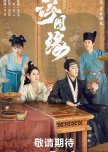
Missing parts.
Let me preface this review with a warning - this is a well-loved drama that I simply fail to appreciate. If my criticism of it will offend you or ruin the joy you found in it, best give this a skip.The soundbites are tantalizing: a taboo romance between a eunuch and a concubine; a ruthless and scheming male lead; a spirited and clever female lead; and palace conspiracies and mysteries aplenty. Not to mention Wang Hedi's Xiao Duo exudes that intense tall, dark, and dangerous kind of sex appeal that screams he is no Lord Varys. So I jumped in despite my reservations over Chen Yuqi's acting. As it turns out, that is one of the drama's lesser problems.
This drama is an inane attempt at dark satire aimed at the obscene privilege of emperors. It opens with the shockingly cruel practice of sending off childless concubines, known as tribute ladies to accompany the emperor in the afterlife. After high powered eunuch Xiao Duo rescues Bu Yinlou from this dastardly fate, an alliance of sorts forms between the two as they navigate treacherous palace politics in a time of power transition. I like how it was just a mutually beneficial relationship initially and how they disliked and were wary of each other; that the romance did not blossom instantly. Where it falters is in showing me why the two most powerful men in the palace connect with and fall so utterly for a woman afflicted by bizarre facial paroxysms.
Xiao Duo's wicked ruthlessness is gleefully conveyed with wit, panache, and flawless comedic timing by Wang Hedi. This is well matched by Peter Ho's slightly over-the-top portrayal of the deceptively simplistic, cartoonish-ly obsessive, and delusional emperor. Both portrayals convey each character's underlying ethos; a past sadness and secret loneliness. Unfortunately, Chen Yuqi’s jarring and tacky comedic interpretation is far more typical of a slapstick comedy than dark satire. Her exaggerated rapid eye movement and outlandish facial expressions had me triple-checking the synopsis to see if the character is supposed to be epileptic, schizophrenic, or simply possessed. While a huge upgrade from her usual vacuous sleepwalking, for the first 14 episodes, there is little beyond brazen tasteless humor in Chen Yuqi's Bu Yinlou. After that, she gets into character and delivers some really good scenes. She has good romantic chemistry with Wang Hedi that elevates her performance and the more serious tone the story takes also helps. But her acting is not consistent and wobbles again at the ending episodes. It highlights her limited range and is quite inexcusable for someone who is an acting school graduate with a long list of drama lead role credits. This is the best I have seen from her in years but that says nothing at all.
This drama's biggest issue is that it is missing a good plot. The storyline is contrived, naive and so ridiculous it is disdainful of audience intelligence. The writer's ignorance and superficial understanding of feudal imperial inner palace workings are embarrassing. It is impossible for someone like Bu Yinlou to waltz in and out of the inner palace like it is a hotel, live at a brothel and gallivant all over the kingdom with Xiao Duo. The production leaked "cut" romantic scenes like a sieve, trying to blame the abysmal failure in storytelling on censorship. The truth is all the kiss scenes in the world cannot salvage the messy plot and inconsistent characterizations. We are told both leads are smart characters but they are actually the architects of their own troubles. The allegedly Machiavelli Xiao Duo wrests the crown prince from the custody of the one person with the highest incentive to keep him alive and healthy and puts him in the hands of the person with the strongest incentive to kill him dead! As a couple, they have repeated opportunities to escape, but choose not to. Xiao Duo's revenge is anti-climatic and hastily swept under the rug once the killer is uncovered. They flaunt their affair with such reckless impunity they so deserved to get busted. I stopped caring if they ended up together and sat on the meh ending episode for weeks. I finally finished watching this so you don't have to. To my dismay, they got an ending they didn't earn or deserve.
The bottom line is Wang Hedi is the only reason to watch this drama. He is sexy even when he glowers and scowls and his costuming and visuals in this drama are swoon-worthy. In fact, save yourself some time and just watch all the fan-made videos of the romantic scenes hard-core fans have stitched together. You can skip all the rest because as foreshadowed by the eunuch theme, this drama has critical missing parts. I can only rate it 6.5/10.0 to finish at the rock bottom of my completed list for 2022.
Was this review helpful to you?
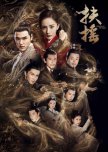
Fantastic appetizer but don't bother with the main course and desert.
This drama really wowed me at the beginning - heart stopping kungfu fight scenes, the two leads had good banter and chemistry, the set was gorgeous (obviously big budget) and the story had a good balance of intrigue, romance, action and good and evil characters. I was hooked and truly enjoyed the first 25-30 episodes of it. Then just when you are at the point of addiction, the show peaks, which is just plain cruel. And then in a truly impressive way the show crashes and burns, getting progressively worse as it advances. I kept watching in the desperate hope that it would turn itself around but sadly it did not. It was as if an entirely different production crew took over and set out to purposely destroy the show. The plot meandered down multiple mind numbingly boring and ultimately repetitive political plots to steal the thrones in 3 of the 5 kingdoms only to be foiled by Fuyao and her friends. There were lots of unnecessary side characters and multiple unanswered and non sequitor sub plots. Not to mention the many long winded and boring philosophical discussions that I strongly suggest fast forwarding through unless you have trouble falling asleep at night.Ethan Ruan and Yang Mi were great together most of the time and especially at the beginning. However, there were long periods where Fuyao/Yang Mi was on her own and the story/actress could not really carry those moments alone, frequently coming across as reckless and annoying. I did not love the supporting cast either and I felt that Vengo Gao's role/storyline was almost as if they were trying out two potential male leads with parallel (repetitive) plots to see which was better. Obviously Yang Mi and Vengo have zero chemistry and that sub plot that went on forever should have been eliminated altogether. I guess the entire crew was being paid by the episode judging from how it ended up being all pasted together to create one big mess of a storyline. Its a shame because this could have been a terrific and memorable (much shorter) drama with some ruthless editing and tighter script/plot writing.
The only thing epic about this drama is the effort I had to put in to see it through the end. Starts with a bang and then death by a thousand cuts of boring inanity. This is one of those shows that definitely would have benefited greatly from the latest Chinese government ban on excessive budgets that lead to too many unnecessary episodes in Chinese costume dramas. To be fair, I would say the first say 30 episodes are actually worth watching. If you can endure some suffering you can even watch a few more episodes until Fuyao discovers Wu Ji's real identity. After that, do yourself a huge favor and drop it. You will just feel angry and cheated if like me, you persist until the bitter end because it then becomes just so, so much more bad than good.
Was this review helpful to you?

Flower Power.
The Starry Love is a divine comedy packed with romance, sisterhood, friendship, adventure, mystical powers, and gut-busting laugh-out-loud moments. It takes dead aim at the tired, cliche-ridden xianxia formula. I was sold on both the drama and the female lead the moment she asks the most relevant question; after thousands of years, does the equipment still work? I laughed so hard that I fell off my treadmill. Be warned; it can be life-endangering to eat junk food or sip wine while watching this hilarious xianxia spoof.This story rehashes a well-known plot about mixed-up brides where two sisters end up with each other's intended. Born under auspicious omens, the elder, virtuous, and good-natured Princess Qingkui is engaged to the aloof and righteous Shaodian Youqin, Sky prince and protector of the realm. The ill-omened, defiant, and mischievous younger Princess Yetan is to be married to the ominous Void realm, where the unfavored, scheming, and ruthless third prince, Chaofeng plots against his brothers to be the next Void Tyrant. Through a comedy of errors, Yetan ends up in the Sky realm where she turns the world of the pompous Youqin upside down while Qingkui stupefies the nefarious Chaofeng with her goodness. Both couples hilariously discover that opposites attract and two wrongs make a right. All too soon they discover that they are twin flowers born from a sacred tree that can unleash chaos on the four realms. Can their flower power prevail over destiny or will their stories only be remembered by the starry skies?
The more familiar you are with common xianxia tropes, the funnier this drama is. The plot unfolds along recognizable lines, gobsmacking you with unexpected twists along the way. The sisters truly love and support each other and the friendships are genuine and tested by hardship and sacrifice. While there is a healthy dose of the genre-defining angst that made my eyes burn with tears, it is usually short-lived, turning into humor in the blink of an eye. This is a very self-aware drama that pokes fun at the absurdity of tired tropes by acknowledging that even invincible immortals fear death, that the Sky realm is a very boring place and most of the eye candy lives in the Void realm. While it is a humorous fresh take on the genre, the underlying messages about good and evil are all too familiar and there is not much substance to the story.
It is undeniable that the sis-mance and romances are the highlights of this drama. Each sister finds in her mate all the qualities she loves best in her sister! The sisters are loyal to each other almost ahead of their lovers and their men get it and accept that there are more important things than love. Newcomer Chen Muchi gave me palpitations with his sexy and charismatic portrayal of the duplicitous and manipulative Chaofeng. It was a joy to watch Qingkui awaken that spark of conscience that sets him on the right path without losing his air of devil-may-care wickedness. I was initially less impressed with Chen Xingxu's cliched and stiff portrayal of Youqin's stony indifference. But the way Youqin comes alive once that facade crumbles and how he shows us the many sides of Youqin - germaphobe, pyromaniac, mercenary, and playboy; once again attests to this actor's versatility and mastery. Chen Xingxu's and Li Landi's wonderful chemistry and the way they are able to play off each other's emotions and reactions are authentic and captivating. Li Landi is really a young actress to watch. Her Yetan is so brave, naughty, and infectiously bubbly that it is no wonder she had not just Youqin but the entire Sky realm at her feet. All four lead actors have excellent comedic timing and the impressive ability to pull off many simply uproarious lines with a straight face.
The biggest criticism I have of this drama is the overuse of bright lighting and the over-lit Sky realm. It makes for an overbearing visual experience that makes the back of my eyeballs feel like I have been staring down a torchlight. The production values and CGI are not the best and almost made me skip this drama, which would have been a mistake. Because it is addictive from the start and overall well-paced although it loses some momentum in the mortal realm before reaccelerating to the finish. The final arcs take on a more serious and angsty tone and the villains are a bit cliched and too easily identifiable. It also overuses the bad dad trope and some of the rationale of the Sky emperor in particular does not bear close scrutiny. Although many are not pleased with the ending, I have watched enough xianxias to expect something like that so it just made me laugh. I think it was quite comical and oddly fitting with the spirit of the drama. I am happy to recommend this as a very enjoyable light watch. I rate it 8.5/10.0.
Was this review helpful to you?

Women hold up half the sky.
Song of Youth is a historical Chinese soap opera that pays tribute to 红楼梦 Hongloumeng (Dream of the Red Chamber), widely regarded as China's greatest novel. Fans of the novel will immediately recognize that the backstory of an aristocratic family in decline and the multiple character blueprints that are based on this vernacular classic. Uniquely, this narrative plucks out the all-consuming, angsty, tragically epic love triangle that forms the core of the novel and focuses instead on broader, often less appreciated themes. The love triangle is still there but it is been muted to the extent that it is only peeks out towards the end.Lin Shaochun, a talented actress from a performing troupe marries Sun Yulou, the youngest scion of the noble Sun family. With her innate resourcefulness and the support of her husband, she becomes indispensable to his initially disapproving family by ably resolving all their internal and external conflicts and challenges. Bai Lu as always delivers a very enjoyable performance as the supportive and loving wife of Sun Yulou and the clever, thoughtful and femininely authoritative Sun family fixer. Even though I think Wang Yizhe has a lot of potential as an actor, he struggled to get into character and I didn't see much spark between him and Bai Lu. But it doesn't matter because albeit with some challenges, their arc is short and it is ultimately a rather pedestrian love match. After that the narrative explores more complicated and more poignant relationships where the couples have limited ability to make their own choices. Very much like Court Lady, Lin Shaochun is just a tour guide through the social structures, culture, relationships, vanities and daily life details of feudal 18th century China. Thankfully unlike Court Lady, Bai Lu's portrayal of the role as occasionally ruthless and not overly preachy and righteous makes Lin Shaochun very likeable if too infallible to be that interesting.
What stands out about this drama is that very much like Hongloumeng, it celebrates the contribution of women to society - Mao Zedong was far from the first to acknowledge that women hold up half the sky. True to the novel, the drama is very female centric - Lin Shaochun is the main protagonist and in a fitting role reversal the ML Sun Yulou is just a prop; an attractive, decorative vase. Even the best antagonists are formidable and devious women. In fact, most of the male characters in the drama are rather weak and not that intelligent - Sun Yulou only pulls himself together to be worthy of Lin Shaochun, his oldest brother is a foolish gold digger's wet dream, his second brother is the most capable of the lot and his third brother is a henpecked wastrel. All of them become better, more successful men thanks to their smart, determined and capable wives. I find both the eldest and (especially) the second brothers' stories to be far more interesting than that of the main CP. Unfortunately the second brother's story fizzles out in the middle and ends in a slightly disappointing way. Nonetheless, Yao Dizu is by far the most multi-faceted and refreshing character in the drama, more so than Lin Shaochun. She is also the only character that gets to be the author of her own story. If Lin Shaochun were written to be more of a bystander and less of the person who always saves the day, this would be a much better drama. She always wins by the same modus operandi so by the second or third arc, I was on to her and the "twists" become predictable.
The other problem with this drama is that it doesn't seem to be written in one voice or tone and thus gives the impression that it doesn't know what it wants to be. I think it is intended to be a satire or parody of bourgeois upper society during Ming Dynasty. Unfortunately in parts the humor is quite slapstick when it comes to Lamu Yangzi and some of Jin Chen's scenes because that matches the kind of humor they do best. Bai Lu and the rest of the cast however, are better suited towards more subtle, satirical humor and when the writing tries for something in between, it comes across as forced and half the time it misses the mark. That said, there are some really good laugh out loud moments but overall the wit and humor is hit or miss. The rhythm of the screenplay is particularly awkward at the beginning but more enjoyable from the middle episodes. After the four brothers' stories, the recycling of themes around the fallout from arranged marriages gets old and the final arcs flatline - I saw the final end twist a mile away so the end was predictable and anti-climatic.
This gorgeous production was clearly shot with meticulous attention to detail from the sets to the authenticity of the costumes, make up and the cultural details. The only lapse is perhaps the fact that the classic Cantonese opera Legend of the Purple Hairpin is sung in Mandarin and not in its original language (this was one of my grandma's favorite operas, she used to play the Liza Wang/Adam Cheng recording all the time). Overall a high quality production that is an enjoyable light watch even though it falls well short of Hongloumeng in terms of panoramic impression, breadth of social commentary and lasting impact. This is fun enough for me to rate this a 7.5.
Was this review helpful to you?

A cacophony of crows.
The Story of Minglan is a leisurely and meandering account of how with patience and cunning, Sheng Minglan, the low born daughter of a concubine triumphs over many challenges to achieve both personal and social success. Minglan's father is a middling court official who over indulges his favorite concubine and allows her to turn his household upside down. The petty tyranny of harem rivalry leads to tragedy and Minglan ends up being raised under her grandmother's wing. Minglan's great misfortune has a giant silver lining because this formidable old lady is a force to be reckoned with. She sees to it that Minglan is well schooled and helps her navigate the many pitfalls of harem politics. Minglan blossoms into a quietly underestimated young lady who catches the eye of the most eligible bachelors despite her low status.This drama digs deep into what lurks beneath the genteel façade of Confucian propriety among the status conscious Song dynasty nobility. The deceptively sedate, mundane, humdrum of women living lives of quiet desperation, occasionally broken by shrill outbursts that crescendo horrifyingly in a cacophony of crows. My eardrums barely survived the assault of this panoply of nasty, caterwauling women. The early arcs on Minglan's childhood and coming of age are the best, most empowering ones. The drama climaxes at her vengeance arc, where I found her quiet scheming and utter ruthlessness chilling and impressive. After that the domestic bliss arcs drag on far too long with the couple dealing with repetitive villains with all too similar modus operandi. We really did not need to see version 2.0, 3.0 etc of essentially the same not very smart wicked women archetypes that are too handily dealt with by our power couple.
Zhao Liying delivers a credible portrayal of a docile, Song dynasty noblewoman with hidden depths. The way she digs into you with her eyes, the fleeting cunning smirk and brief flash of fury in her placid gaze foreshadows her evolution into a full-on temper tantrum throwing wife! That said, Zhao Liying is still best at fierce roles rather than as a docile still waters run deep kind of character. Zhao Liying and Feng Shaofeng paint the perfect picture of domestic bliss.Their chemistry is that of a long married couple in harmony and less of the sizzling kind that flared up between her and Lin Gengxin in Princess Agents. It is rare to see Zhu Yilong in a costume drama and I felt real sorry for his Qi Heng who unlike both Gu Tengye and Sheng Minglan, has no free will as he is unable to free himself from the social strictures of his time. The cast overall is very strong with many veteran actors that deliver comical parodies of the ridiculous pretensions of the Song aristocracy.
I am afraid I did not enjoy this very well made drama as much as many other people did. The 70+ episode narrative goes on for too long, conveying an unnecessarily realistic impression of how suffocating it was to be a Song dynasty woman. Considering Gu Tingye's incredibly modern attitudes with respect to polygamy and empowering his wife, I am convinced it was impossible to be a Sheng Minglan in those times. Some of the early arcs are worth 8.5 but the story climaxes too early and is bogged down by repetitive plots in the latter half. This weighs my overall rating down to 8.0. This is a drama that patient viewers with robust eardrums will enjoy more.
Was this review helpful to you?

An Oriental Odyssey.
Chu Sijing, a captain of theJinyiwei/锦衣卫 or Embroidered Guard is on a mission to investigate a strange epidemic that broke out on the remote Wumu Island in Liaodong province. The outbreak threatens the adjacent NInghai Fortress, a critical stronghold against the invading Jurchens. The powers that be have their own agendas and appear more interested in covering up the outbreak than anything else. Thus Sijing steals onto the island aided only by a Mongol Tartar official Bo Yan and a Fulangji/佛郎机 businesswoman Angelica. There he encounters mysterious, disease afflicted villagers who worship ancient Gods and is forced to deal with some monstrous truths. Can he weed out the root of the epidemic before it overwhelms them all?This story is set in the 3rd year of Tianqi, when the Ming Dynasty was in rapid decline. It was a time of many natural disasters from meteorites to a mini ice age, drought and famine. Superstition reigned high as the peasants were starving and the emperor was widely said to have lost the Mandate of Heaven. The drama invests heavily in world building and weaves in many themes from the period and fantastical creatures from Chinese mythology 山海经/Classics of Mountains and Seas and 神异经 / Classics of Gods and Spirits. Even though the CGI is not the best, I appreciate the effort that went into how they blended history, fantasy and ancient lore together to make this an Oriental odyssey.
Unfortunately all the research and creativity that went into world building is wasted on the story's plot which hints heavily at a complexity that never materialises. For such a short drama, there are too many subplots touching on many themes that go nowhere. Even ignoring Sandrine Pinna's appalling Disney cartoon character acting, the entire Angelica/Pirates of the Caribbean arc adds nothing to the story. The time would be better spent fleshing out the motives of the Henggong cult and tying up the many loose ends to the story. I usually like Huang Xuan's acting and enjoyed his chemistry with Bo Yan but this is not his best role. Maybe it is the overuse of green screens but I caught him frequently out of the moment and staring blankly into space. Shen Rang is the only character that really moved me and I enjoyed this character design and portrayal the most.
The best things about this drama are that it does try to be different, it is short, some of the action scenes are pretty good and it is oddly enjoyable despite its lack of logical consistency. The ending is anti-climatic, doesn't hang together well, leaves loose ends and is disappointing overall. I am being generous in rating this as a 7.0/10.0.
Was this review helpful to you?
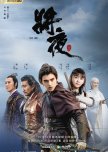
Beware of false prophets.
Ever Night is an epic fantasy adventure hit set in a mystical, ancient world where the balance of power between rival kingdoms is maintained with the aid of powerful warlords and cultivator sects. The vivid stunning palette is infused with an ominous sense of dark prophecy. The soothsayers warn that the child of darkness will bring an ice age or ever night and chaos to the world.The main protagonist Ning Que makes an thrilling debut as a lethal, almost ferally vicious warrior in a ferocious, spectacular desert ambush. This opening sets the tone for some of the most exhilarating and well choreographed fight scenes that Chinese drama has to offer. The drama is visually spectacular and delivers on the hype on many fronts, especially in terms of its movie quality production values. The sweeping breadth of the story can be overwhelming in the sheer number of characters representing different kingdoms and sects that makes the story appear more complicated than it really is. This is really the story of Ning Que (and by extension Sang Sang's) quest for revenge that sets him on an epic journey to become one of the strongest cultivators in Haotian.
Ning Que is an anti-hero. He is ruthless, cunning, manipulative and can be quite dishonourable. While at at times Chen Feiyu's acting could do with some polishing, he is superbly cast as Ning Que. He emanates that simmering resentment and burning thirst for vengeance that propels Ning Que to prevail against overwhelming odds and superior foes. With his lithe powerful build, his combat scenes are bloodthirsty and violent and his facial expressions are vicious, almost feral. Ning Que's arch-rival the glorious Prince Longqing is an interesting mirror character on a parallel path that makes different choices at important milestones along the way. What is quite remarkable about this story is there are no outright villains. The world they exist in is cruel and fraught with peril and conflict among competing interests. Thus both the antagonists and protagonists have to do ruthless, even terrible things to survive.
Unlike others, I am not troubled by the relationship between Sang Sang and Ning Que. They have no blood ties, they are simply found family and have a complex and multi-layered relationship that is likely predestined. In fact, I think it is inevitable where the relationship must go. As much as I enjoy their undeniable chemistry and clear bond immensely, to me the real issue is that Chen Feiyu and Song Yiren should never be cast together in a romantic capacity. Chen Feiyu is exceptionally tall and Song Yiren is exceptionally petite. Her youthful features and small size makes her look like a child next to him. This visual imprint is so strong it is practically impossible to imagine them as a couple. Their relationship in Season 1 remains platonic and is not troubling but it is a good thing that Wang Hedi replaces Chen Feiyu as Ning Que for Season 2.
In terms of storytelling, there are issues with pacing and the breadth and depth of the character and world building is perhaps overly ambitious in scale. Even though I love how there are different schools of cultivation and cultivators are able to gain immense power via different theologies and practices, I find the excessive pontification and philosophical discourses mind numbingly boring. That said, I appreciate the ultimate irony of how many powerful cultivators are ruled by superstition and fear of ever night or the child of darkness. While the worthy ruler and the true wise men know to beware of false prophets. The political arcs are not that interesting and Princess Li Yu and her brother don't add to the plot. They just take up space and despite all the screen time, this and several other sub plots like the inner politics of the West Shrine and Yan State go absolutely nowhere. Obviously this lays the back story for multiple (?) seasons but unfortunately none of these sub plots and characters are interesting enough to make me want know what happens to them.
Despite the digressions and morass in the middle, the drama builds towards a very strong ending. I was truly moved by Ning Que's speech when he finally confronts his family's killer and I was really impressed by Chen Yufei's acting in that moment. "Why does it always have to be a prince?" is one of the best, most memorable lines from this show. The build up in tension, that sense of dread and hope into the ending confrontation is superb. The final fight scene is epic, full of surprises, utterly savage, desperate, exhilarating. It was everything I didn't even know I was craving for. Even the CGI is amazing.
I thoroughly enjoyed many aspects of this heroic saga and I am happy to recommend this as a not to be missed drama for action and adventure buffs. But unfortunately there are many parts of it that I did not enjoy and I feel strongly that the production over indulged in laying the backstory for many subplots that only play out in subsequent seasons. I am going to go with an 8.5 because the production values and fight scenes are exceptional. Going purely on storytelling alone however, this is at best an 8.0.
Was this review helpful to you?


 26
26 118
118 7
7



















